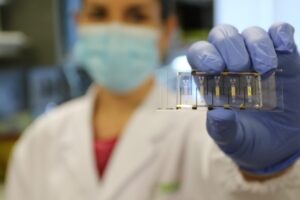80% of chronic infections are associated with the growth of biofilms. They are bacterial communities of different species that form and live on surfaces of live or inert tissues. These types of infections are complex, difficult to treat and often last for a long period of time, as biofilms are embedded in a matrix that protects bacteria from antimicrobial treatments and the immune system, thus becoming much more resistant to antibiotics. Despite the clinical importance of biofilm-produced infections, up to date no simple and effective method have been described for diagnosing their susceptibility to antibiotics or evaluating new strategies for their control and eradication.
Now, researchers from the Institute for Bioengineering of Catalonia (IBEC), led by Eduard Torrents, leader of the group “bacterial infections and antimicrobial therapies” and professor at the University of Barcelona (UB), in collaboration with Josep Samitier, principal investigator of the group “Nanobioingineering” of IBEC, and Maite Martin, of the Valld’Hebron Barcelona Hospital, have developed a new device, called BiofilmChip, which allows a custom and precise diagnosis of chronic infections. This work has recently been published in the journal of the group Nature, Biofilms and Microbiomes, and is supported by “la Caixa”Foundation.
This new device will allow biofilms to grow in the laboratory by reproducing the conditions that occur during the infection process. Thus, it will be possible to determine its pattern of resistance and sensitivity to different antibiotics and to identify the most suitable treatment, even in a personalized way for each patient.
Biofilmchip opens the way to the study and treatment of biofilms, both in chronic infections, cystic fibrosis and lung or urinary infections, as in areas related to the contamination of hospital material (catheters, heart valves and prosthetics) or in the food industry (surfaces and work plans).

The misuse of antibiotics in addition to chronic infections caused by biofilms is leading to an increase in bacterial resistance. To date, no antibiotics capable of eradicating biofilms have been described, among others, because of the lack of a truly effective in vitro system enabling the research and development of new antibiofilm molecules.
Biofilmchip allows the cultivation of the biofilm as such, with the entire bacterial community that’s forms it, unlike the classical microbiology methods where bacteria are grown separately on individual plates. This point is crucial, as bacteria have very different susceptibility to the same antibiotic if they are isolated or being part of a biofilm.
Our BiofilmChip allows to assess the action of different antibiotics directly on a biofilm, getting much closer to what happens in real infections. Nuria Blanco-Cabra, principal co-author of the study
In collaboration with Vall d’Hebron Barcelona Hospital, researchers have grown inside the BiofilmChip bacteria contained in samples from patients suffering from cystic fibrosis. BiofilmChip is a micro-fluidic platform that allows to deliver not only the nutrients and compounds necessary for the biofilm growth, but also the different antibiotics that need to be tested.
In this device, an electrode has been integrated to determine bacterial growth and biofilm response to an antibiotic or treatment, by detecting electrical parameters (impedance). At the same time, the device allows to observe the biofilm under the microscope without prior manipulation. The use of Biofilmchip is simple and does not require a complex infrastructure to function, so it could be routinely used in clinical microbiology laboratories or in industry.
The results we obtained with BiofilmChip show that it is a very useful tool for determining the susceptibility of biofilms to antibiotics and that it could beeasily implemented in hospitals.Maria José López-Martínez, principal co-author of the study
Reference article: Núria Blanco-Cabra, Maria José López-Martínez, Betsy Verónica Arévalo-Jaimes, María Teresa Martin-Gómez, Josep Samitier, Eduard Torrents. A new BiofilmChip device for testing biofilm formation and antibiotic susceptibility. npj Biofilms and Microbiomes (2021) 7:62.